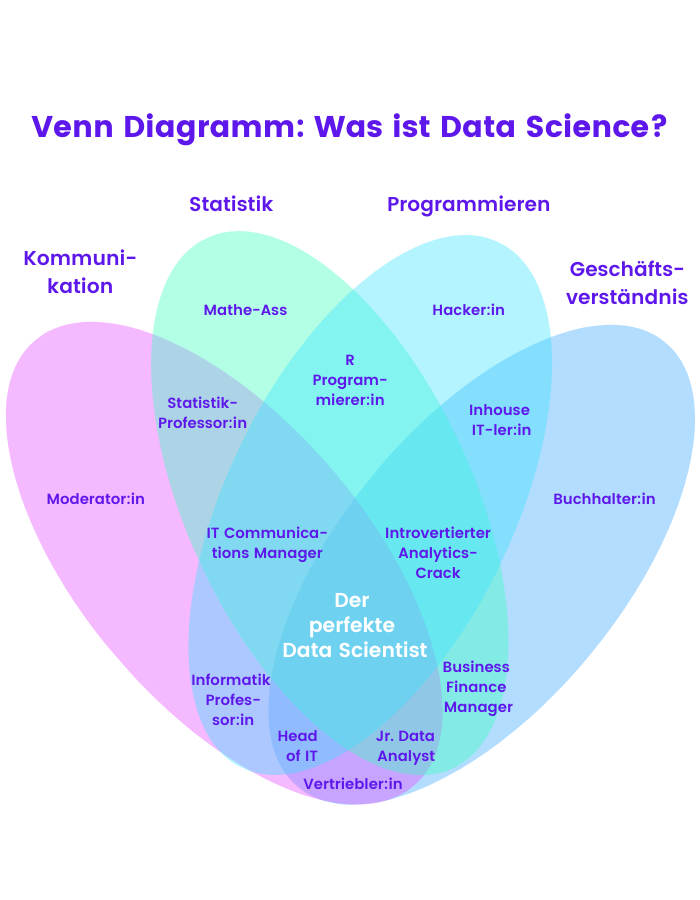If you're interested in a career in Big Data and data processing, there's no way around them: the highly sought-after job roles of Data Analyst and Data Scientist.
Although the hype around data experts is undeniably great and is not abating, it is still not clear to everyone what the difference between Data Analyst and Data Scientist is. Both work with data, but not quite in the same way.

In this series of articles "Data Scientist vs. Data Analyst", we compare both job descriptions and clarify whether you are better suited as a Data Analyst or Data Scientist. We will take a look at the differences and similarities, career paths, tasks, essential skills and the salary as a Data Analyst and Data Scientist.
*Disclaimer* When we refer to Data Analysts and Data Scientists in this article, these job titles are intended to be gender-neutral and refer to men, women, as well as gender-neutral individuals.
This is why Data Analysts and Data Scientists are so popular
Data Scientists and Data Analysts are two of today's most in-demand and highest-paid professions. The Future of Jobs Report of the 2020 World Economic Forum actually lists both occupations at the top of the most in-demand occupations across all industries, followed directly by AI, machine learning and Big Data specialists, and software developers.
The same report also found that job seekers and career changers in particular are increasingly qualifying for jobs as data scientists and data analysts through online training. That's why it's worth taking a close look at which job really suits you, your strengths and your career goals.
Why is it worth becoming a Data Analyst or Data Scientist? Data Analyst and Data Scientist have some advantages in common. Let's take a closer look at what you can look forward to in your job as a Data Analyst or Data Scientist:
In both professions you can work in the office as well as in the home office without any problems, all you need is a laptop and an internet connection.
As a data analyst or data scientist, you can choose from a wide range of job offers and work both as a permanent employee and as a freelancer in almost any industry. Stepstone currently lists 10,000 free Data Analyst Jobs and 1.000 free Data Scientist Jobs. [As of 04/20/2022]
Since both jobs bring such universal skills, they are also great complements and career boosters for most jobs. Even if you don't want to work as a Data Analyst or Data Scientist, you can use that rare knowledge and valuable skill set to advance your career. Basic to advanced data skills are needed in almost every discipline and department, whether in marketing, HR, or finance. The demands of the job market are constantly shifting towards data-driven work. For this reason, further education is worthwhile in any case.
Due to the increasing demand for Data Analysts and Data Scientists, you can expect an above-average salary. We will go into this in more detail later. You also have a high level of job security with a very promising, exciting profession that offers good career opportunities, is in demand in all industries and is crisis-proof.
Become a data analyst or data scientist without studying? Yes, that is possible. Nowadays, further education is sufficient for your additional qualification. You can even learn the job as a data analyst and data scientist online. There are several options for this, which we will also discuss below.
If these advantages of both data professions sound motivating to you, let's take a look directly at the tasks as a Data Scientist and Data Analyst.
What are the tasks of a Data Analyst and Data Scientist?
If you compare the profession of painter with that of baker, you can draw very clear dividing lines. But when comparing data scientist vs. data analyst, we tend to move along a spectrum.
The fact that the two professions are not so easily distinguishable from each other is partly due to the fact that they are still comparatively young and companies do not always draw this line clearly in their job offers because they find it difficult to distinguish between them in terms of content.
The fact that Data Analyst and Data Scientist may have similarities in their tasks and skills in no way means that they are interchangeable or synonymous. In fact, both professions complement each other when they work toward the same project goal. Let's therefore take a closer look at the areas of responsibility.
The scope of duties of Data Analysts
The tasks of data analysts are basically consulting-oriented. In their day-to-day work, data analysts are tasked with processing data from SQL databases or even Excel spreadsheets and examining them for patterns. These patterns are intended to provide management or specialist departments with revealing insights so that they can draw informed conclusions and make improved, promising business decisions.
To do this, a data analyst analyzes past business events, such as sales, online store registrations, or even medical diagnoses or natural events. In addition, a data analyst must be able to perform clean A/B tests, where two factors are tested against each other to determine trends. With the results collected, data analysts can then advise business managers or product developers on which option is more likely to produce the desired result.
Why do companies need data analysts? Not every person who makes important decisions in a company has the necessary skills to evaluate business data. The danger would be too great that decision-makers would rely only on their gut feeling, leaving the result to chance. They are therefore absolutely dependent on the skills and advice of data analysts.
Although we will discuss the skills that data analysts need for their job later, it is already clear here that they need to have particularly good communication skills in their consulting role.
Not only can few decision makers evaluate data themselves, most can understand and act upon the evaluation without a detailed explanation. This is where data analysts come into play again. It is their central task to visualize data, to put it into a business or even industry-specific context and to present this in a collected and understandable way.
It is important that data analysts do not falsify anything or only report what decision-makers want to hear. They are like detectives or investigative reporters who make their unbiased findings available and ensure that everyone can understand them.
This makes career changers particularly valuable if they have already worked in other jobs at the same company or in the same industry and have gained extensive industry or process knowledge. It is also extremely helpful for data analysts to be well-connected, as they often need to work closely with departments to gather information or share insights. If you understand how a department works and what processes and information are important to them, you will quickly make yourself indispensable as a Data Analyst.
The scope of duties of Data Scientists
While Data Analysts often have clear work assignments, Data Scientists face the great potential of the unknown. Data Scientists are therefore expected to have a deeper and at the same time broader expertise and skills than Data Analysts. They are therefore also paid significantly more for their specialization. We will discuss the salary in more detail below.
Compared to the consulting Data Analysts, Data Scientists see themselves more as researchers and developers. Not every Data Scientist has the same tasks, but can use algorithms to model data queries, automate processes, train an artificial intelligence with machine learning and thus develop new business opportunities for the company.
Unlike data analysts, they typically use their advanced programming skills to create data pipelines, for example, which automatically transfer data from one source to another. Their skills thus enable them to use sophisticated technologies such as artificial intelligence to make even more accurate predictions or to develop smart products using machine learning.

Data Scientists combine several disciplines: mathematics and statistics, computer science, communication and industry knowledge. In the data industry, Data Scientists must be better at statistics than software engineers and better at programming than statisticians.
For this reason, it is clearly advantageous for Data Scientists to come from research or a quantitative or STEM (mathematics, computer science, natural science, technology) professional field and to have previous experience.

Data Analyst vs. Data Scientist - Part 2
In Part 2 of the Data Scientist vs. Data Analyst article series, you'll learn more about the average annual salary for Data Analysts and Data Scientists, career stages, requirements for the two jobs, skills needed, and how to master the job entry process. Click here for Part 2 of the series.
Sources
World Economic Forum (2020): The Future of Jobs Report 2022 [05.04.2022]
Stack Exchange (2021): Data science without knowledge of a specific topic, is it worth pursuing as a career? [07.04.2022]
Glassdoor (2022): Salary for Data Analyst, Munich, Germany [01.04.2022]
Glassdoor (2022): Salary for Data Scientist, Munich, Germany [01.04.2022]




